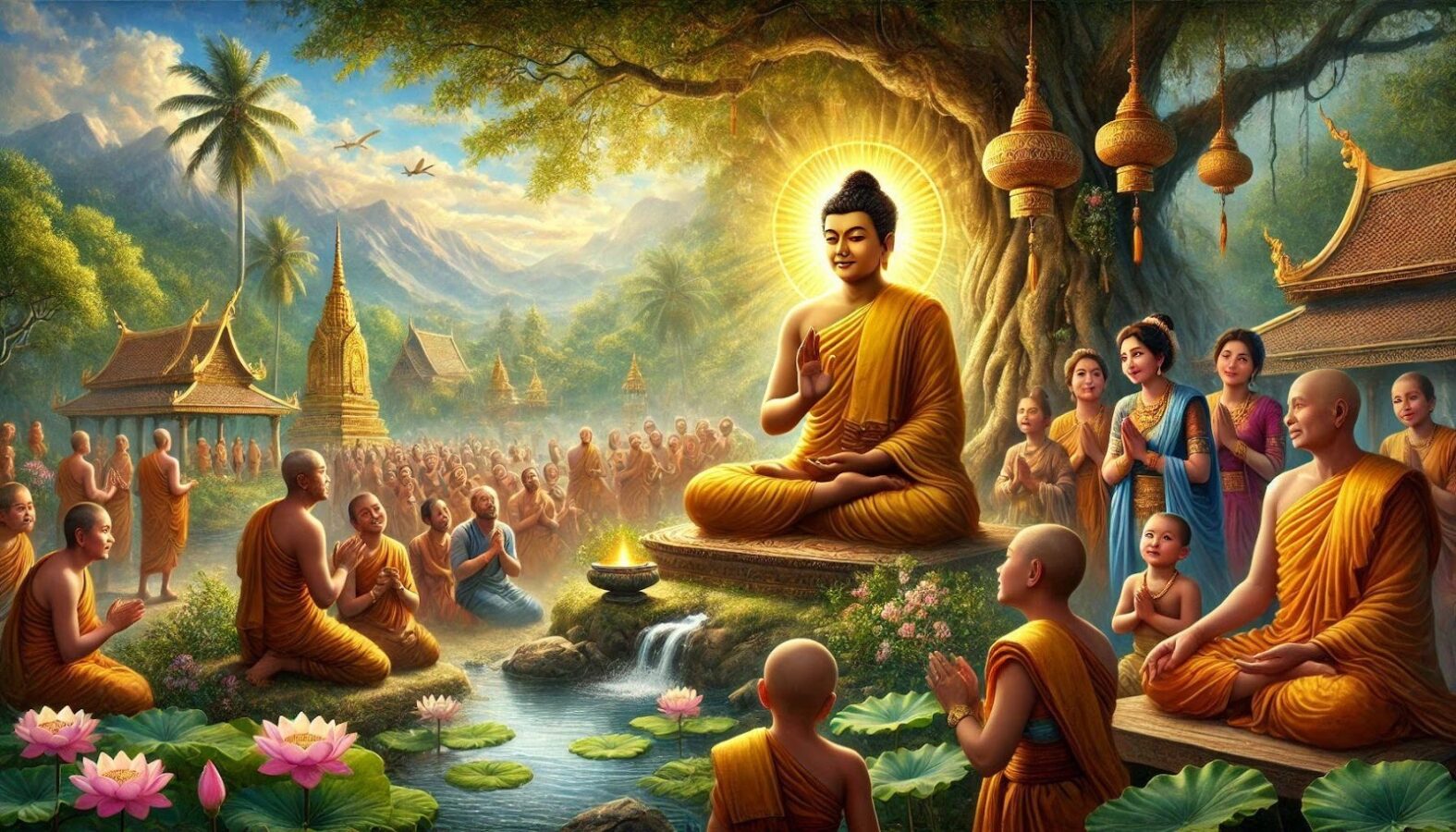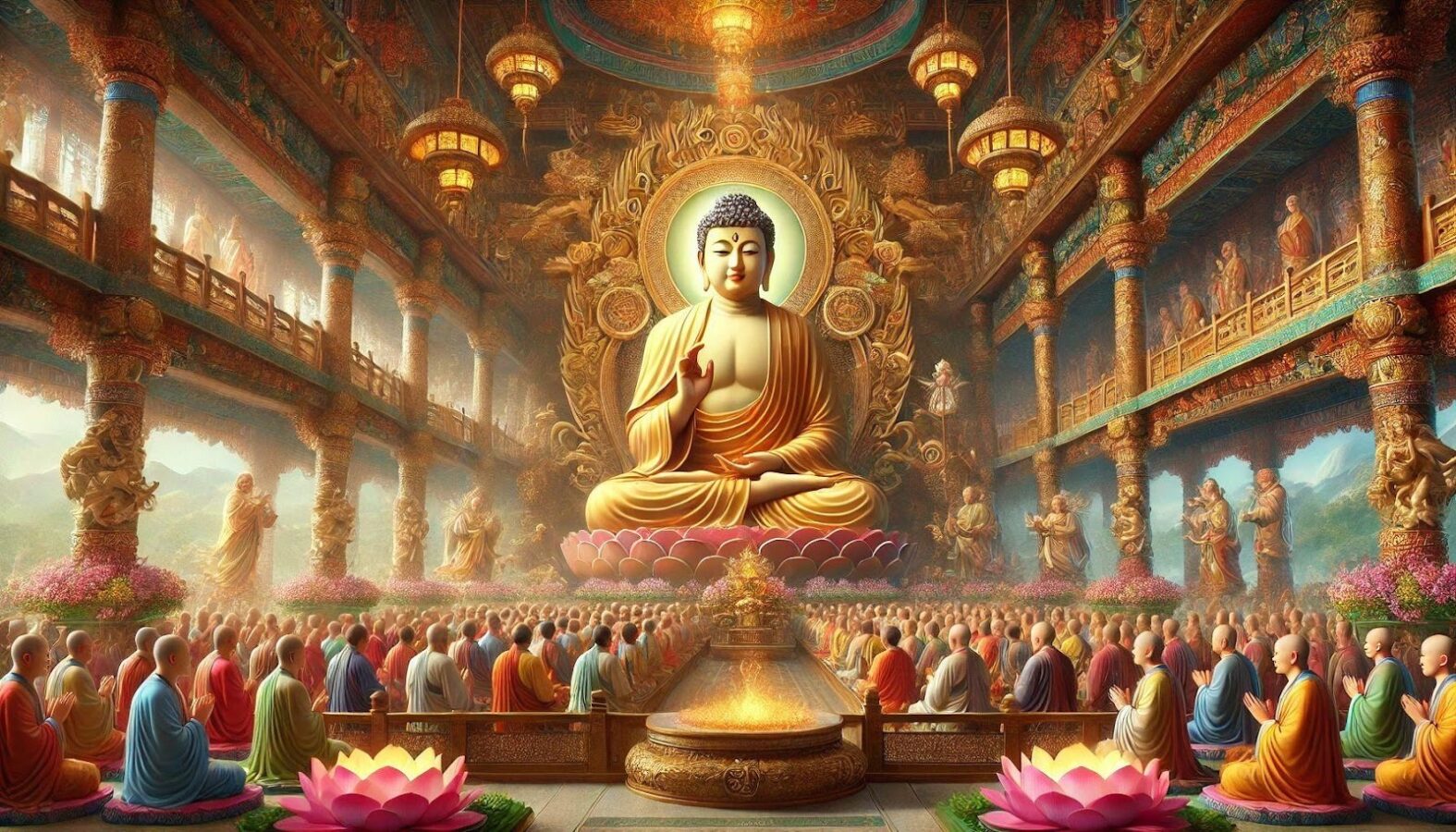
Date: 08/16/2025 08/17/2025
Location: Star Lake Meditation Center
Teacher: Shilin Long
Dharma Talk
Compassionately Transforming into a Whale to Save Sentient Beings
In a past life, when Śākyamuni Buddha was practicing the bodhisattva path, he was a merchant named Pinju, who often traveled between countries for trade. This time, Pinju and a group of friends sailed to a distant land for business.
During the voyage, Pinju frequently stood on the deck to get some fresh air. One day, as he gazed at the ocean, he saw a large fish chasing and devouring a school of small fish. The large fish opened their mouths wide, swallowing continuously, while the small fish fled in panic, unable to escape their fate. Soon, the small fish vanished into the mouths of the big fish, their lives extinguished.
Pinju lamented the helplessness of the small fish and the inevitability of the strong preying on the weak. He thought, “Life is vast and enduring, continuously changing forms. Yet, beings unaware of this truth fight and kill each other in every life, creating deeper resentment and hatred, leading to endless cycles of vengeance. I vow to offer my body to the fish to save countless small lives from being hunted by larger fish.”
Thus, Pinju jumped into the sea, sacrificing himself on the bodhisattva path. After this life ended, he was reborn as a massive whale king, leading the sea’s fish to live freely.
Near the coast, a small country was suffering from a severe drought. People, lacking food, resorted to killing and eating each other to survive. The compassionate whale king learned of this tragedy and thought, “How dreadful! When will this drought end? If they continue cannibalizing, they will face extinction.”
The whale king swam to the shallows, hoping to sustain the people with his body. Coastal residents, seeing such a large fish, were overjoyed, thanking the gods for the food. They spread the news: “Everyone, come quickly! A big fish is on the shore; let’s eat it.”
Every day, people brought knives to cut the whale king’s flesh for sustenance. His massive body was covered in wounds. Months passed, and despite the pain, the whale king remained alive. His selfless act moved the gods, who descended to ask, “Compassionate whale king, you feed the people with your body, enduring daily cuts. Why not abandon this body and leave it for them?”
The whale king replied, “I cannot do that. If I die, my body will quickly rot, and the people will face hunger again, leading to more killing and cannibalism. I cannot bear to see such tragedy recur, so I must stay alive.”
The gods, moved by his selfless vow, praised him: “Whale king, your vast compassion will lead you to attain supreme Buddhahood, saving countless beings.”
One day, a villager climbed onto the whale king’s head and, with an axe, severed it to take home for food, ending the whale king’s life.
The whale king was reborn as a crown prince, wise from birth, showing compassion throughout his upbringing, earning the people’s love.
One year, a drought struck the nation, leading to failed crops and widespread poverty. The crown prince advised the king to exempt taxes and lived frugally himself, aiding the people. He deeply repented, believing his lack of merit caused the people’s suffering.
The prince knelt and vowed: “I offer my life in exchange for heavenly rain to relieve the people’s suffering, hoping they can live without worry.” His sincere repentance moved the compassionate Buddha, who led 500 monks to the prince’s country to cultivate blessings.
As the Buddha and monks arrived, the king, prince, and royal family welcomed them to the palace. Along the way, citizens joyfully prostrated, feeling the end of their suffering.
Seeing the Buddha, the prince was overwhelmed with emotion. He knelt, weeping, and said, “Buddha, the prolonged drought and crop failure are due to my lack of merit, bringing disaster to the people. Compassionate Buddha, I am willing to sacrifice myself for their peace.”
The Buddha replied, “Prince, your compassion is known to all Buddhas and bodhisattvas. Your sincere repentance and vow will soon end the nation’s calamity.”
Soon, rain fell from the sky, ending the drought. The people were grateful for the Buddha’s compassion and the benevolent king. Through the Buddha’s teachings, they learned that only by helping and understanding each other, and eliminating jealousy and hatred, can they avoid disasters. The nation’s people revered the Three Jewels and deeply believed in the Dharma, practicing faithfully. From then on, the country enjoyed favorable weather and peace.

